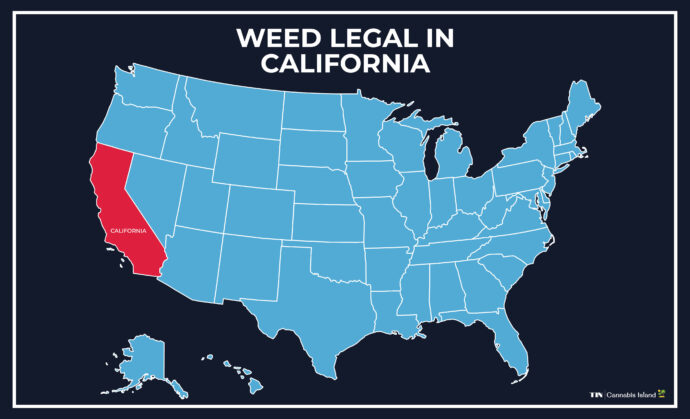Weed, or marijuana, has been a hotly debated topic as more states move to legalize it. A subspecies of the cannabis plant, marijuana contains a large amount of tetrahydrocannabinol (THC), the primary chemical responsible for many people’s recreational cannabis and medicinal uses.
But is weed legal in California? Yes. In California, Proposition 64 paved the way for the legalization of marijuana in 2016. And the 2018 California Health Interview Survey uncovered that 33% of adults 18 or older admitted to using marijuana within the previous month.
Now in California, doctors can prescribe medical marijuana to treat various conditions. Qualified adults may also sell marijuana and also consume cannabis and use it recreationally, but only if acquired properly and legally. Thus, anyone wishing to partake in medical marijuana laws must do their due diligence and become familiar with medical marijuana laws to avoid penalties.

The Present Status Of Weed Legalization In California
California was the first state in the United States to legalize medical marijuana in 1996. As a result of the passage of Proposition 64 in 2016, recreational marijuana became available in California beginning January 1st, 2018.
The law allows adults over 21 to possess up to one ounce of cannabis and grow up to six plants in their homes. It is also legal to buy cannabis from licensed dispensaries.
California also allows cities and counties to set regulations on the sale and use of marijuana, with the state regulating how tax revenues are used.

Legalization Of Medical Marijuana In California
Medical cannabis has been legal in California for nearly two decades. The state was the first to pass a medical cannabis law in 1996. Since then, the state has continued to grow in terms of cannabis-related legislation. Medical cannabis is legal in California under the Compassionate Care Act, which allows adults to possess, use, and cultivate cannabis with a valid medical recommendation from a state-licensed physician as medical marijuana patients.
A Look Back At The History Of Recreational Marijuana In California
Though cannabis has been banned for most of the past century, its deep roots in the area still show today, with California being the first state to legalize recreational marijuana in 1996.
This historical milestone marked a major turning point in the way Americans view and legalize cannabis, and the shift toward legalization over the past few decades has been accelerated in the Golden State.
Cannabis was quite popular in early California and has been known since the California Gold Rush of 1849. Laws eventually changed in the mid-1930s due to the “Reefer Madness” movement, and cannabis ceased to be a public part of California’s culture.
Proposition 215, passed in 1996, greatly changed the relationship between legalized medical marijuana dispensaries and cannabis products and Californians. This event marked the beginning of California’s journey towards the legal and comprehensive regulation of the drug through the Medical Marijuana Program (MMP).
The proposition recognized that medical cannabis contains benefits and should be available to those with qualifying medical conditions. This was an important step in the shift away from the stigma of cannabis to adult-use legalize medical cannabis, and allowed for the legitimization of adult-use cannabis as a drug for medical purposes.
Though recreational cannabis is legal in California, due to the passage of the Adult Use of Marijuana Act (AUMA) in 2016, cannabis remains heavily regulated and taxed. There will no doubt be much more from cannabis legalization in California, but its deep roots in this state have been forever embedded in its history.
The Ban on Marijuana
In July 1937, The Marihuana Tax Act was approved by the federal government, making the recreational use of marijuana unlawful due to punishments and taxes.
Cannabis Eradication
In the mid-20th century, the use of concentrated cannabis was increasingly targeted and heavily punished. In 1972, California passed the Moscone Act, which increased the punishment for both possessing marijuana and selling marijuana.
California Drug Laws For Tourists
When visiting California, it’s important to be aware of the state’s drug laws to avoid getting into legal trouble. Possession of marijuana is legal for adults over the age of 21, but only up to a certain amount.
Possessing more than the legal limit or using marijuana in public can result in fines and other legal consequences.
Also, other drugs such as cocaine, heroin, and methamphetamine are illegal and possession can result in serious criminal charges.
It is also important to note that driving under the influence of drugs is illegal and can result in significant penalties, including fines, license suspension, and even jail time.
Tourists should exercise caution when it comes to drug use and possession while in California to avoid legal issues and ensure a safe and enjoyable trip.
The Legalization Of Weed By The Supreme Court In 2016
In a landmark ruling, the Supreme Court of California ruled in 2016 that the possession and recreational use of marijuana are now legal within California. An influx of celebratory news stories and debates in the legal community accompanied this historic decision.
Throughout the decision, the court weighed arguments around the right to privacy, the role of government in drug users’ lives, and the effects of state taxation on recreational marijuana users.
The Supreme Court ruled that California could not criminalize activities for personal marijuana use, as this could be considered a violation of the individual’s right to privacy.
This was also in conjunction with California’s rules regarding medical marijuana, as this had already been made legal in 1996.
As such, the court found that criminalizing recreational marijuana usage was unjustified from the perspective of legislative precedence set by the state.
The decision made the drug broadly accessible for Californians, though limits and regulations about where the drug can be consumed, purchased, or possessed remain. Local governments and municipalities can also enact laws governing the use of marijuana and the distribution of it within their communities.
2016 Legislation Cannabis Control California
In 2016, California legislators introduced several bills to expand the current laws surrounding the possession and sale of marijuana. Several of these bills were approved and have thus enacted into law various regulations intended to make marijuana more accessible and safe for consumers.
At the federal level, the U.S. Congress and the Supreme Court have taken a more lenient stance toward the adult use cannabis, and possession of marijuana. However, both federal law and federal authorities, and entities still classify the substance as an illegal, Schedule I drug.
The Rohrabacher-Farr Amendment, passed by Congress in June 2015, has restricted the federal government’s ability to infringe on states’ rights to determine their marijuana policies.
The Supreme Court has also ruled in favor of defendants facing prosecution in federal courts for possession of marijuana and similar substances.
Is Marijuana Legal In California?
Yes, marijuana is legal in California. Following the passing of Proposition 64, the Adult Use of Marijuana Act (AUMA), in November 2016, the recreational use and possession of marijuana became legal for individuals aged 21 and older in California.
Medical marijuana has been legal in California since 1996 when voters passed the Compassionate Use Act.
California's Drugs Decriminalization Move
In California, the amount of marijuana legal for recreational use is limited to one ounce. This includes both cannabis flowers and concentrates. Additionally, individuals can keep up to six cannabis plants if they reside where marijuana cultivation is allowed.
When it comes to penalties and punishments for possessing more than the legal amount, California law states that those found with over an ounce may face hefty fines, jail time, or both.
The severity of the punishment can vary, but it is important to remember that the amount of marijuana an individual can possess is limited for recreational use in California.
Effects Of Marijuana Legislation
The introduction of marijuana legislation in California was an effort to replace the decades-long criminalization of the drug with a more restricted, yet still legal, framework.
Specifically, California hoped to create a system that would allow for the purchasing and taxation of marijuana for recreational use, generate new jobs and tax revenue, and reduce the burden on the court system by decriminalizing possession.
Despite these lofty goals, the introduction of marijuana legislation in California proved to be a difficult task. Political divisions, religious organizations, and federal and state law- enforcement agencies all attempted to limit the new federal law that’s scope. As such, many aspects of the federal law have faced delays or even flat-out opposition from those opposed to legalization.
Still, California’s marijuana legislation has remained largely unaltered since its introduction. Purchasing and using marijuana for recreational purposes is now a commonplace occurrence. The legal marijuana industry has brought in billions of dollars in tax revenue and has created thousands of new jobs.
And yet marijuana legislation in California has largely achieved its intended purpose. The drug can now be purchased and used legally across the state. Additionally, the influx of tax revenue and new jobs have proven to be a boon for California’s economy.
Possible Health Hazards Of Legalizing Marijuana In California
Though marijuana is legal in the state of California, there are still a variety of health risks associated with its use. Long-term use of marijuana has been linked to several physical and psychological health issues, ranging from respiratory and cardiovascular problems to cognitive impairment and mental health issues.
Physically, smoking marijuana has been associated with respiratory issues, as is the case with smoking anything. In addition, certain chemicals in marijuana have been linked to an increased risk of cardiovascular disease.
Psychologically, marijuana use is linked to many mental health issues, such as addiction, depression, and anxiety. Due to these risks, it is important to monitor consumption and be aware of the potential health risks associated with marijuana use.
Where To Buy Marijuana In California?
Consumers can purchase marijuana from licensed medical marijuana dispensaries in California either by visiting them in person or through their online store. For those looking to purchase marijuana, it is important to know that there are specific laws and regulations in place that one must adhere to.
For example, only those 21 years and older can purchase marijuana, and any individual must provide a valid form of identification to purchase. Furthermore, certain regulations also limit the amount and types of marijuana that can be purchased.
Marijuana comes in many shapes and forms, not just the traditional “weed.” In California, gummies ingesting marijuana is a big hit, creating the effects of smoking marijuana without actually smoking it. Delta 8 Gummies, Delta 9 Gummies, THC Gummies, and CBD Gummies are all available at dispensaries and online.
Is It Legal To Grow Weed At Home?
The cultivation of weed for medical and recreational cannabis purposes is legal in California. However, certain conditions govern how and where it can be grown.
Home cultivation is allowed if specific requirements are met, such as having the property owner’s permission and having a valid medical need.
However, no more than and only up to eight grams to 28.5 grams of marijuana, or six months of plants can legally be grown at home in California for recreational purposes.
Positive Impacts Of Medicinal Cannabis On Health
Medical marijuana has several health benefits. Most importantly, medical marijuana is a natural, agenda-free alternative to many common prescription drugs.
Its natural potency makes it a preferred option for many, as it lacks the side effects of many common prescription medications.
Additionally, studies have shown the positive effects of medical marijuana on certain disorders, including post-traumatic stress disorder, seizures, insomnia, chronic pain, and glaucoma.
The active components of marijuana have proven therapeutic in controlling those symptoms and treating the condition effectively.
FAQs Regarding Marijuana Act Legal In California
What countries have legalized marijuana?
Several countries, including Canada, Georgia, Thailand, South Africa, Malta, and Uruguay, have made recreational marijuana usage legal. 19 U.S. states, two territories, the District of Columbia, and the Australian Capital Territory, have all adopted laws in favor of its use.
Is it legal to use weed recreationally in California?
Yes. California was one of the first states to legalize recreational marijuana in the U.S. through Proposition 64 in November 2016.
Is it permissible for registered trademarks related to marijuana to be granted by the California government?
No, the California government does not currently allow registered trademarks for marijuana or to sell marijuana or to sell cannabis-only products. However, they protect unregistered trademarks through common law remedies, such as seeking an injunction to prevent a competitor of cannabis retailers from confusing the public about cannabis products by using a similar trademark to sell cannabis or other cannabis products only.
Conclusion Regarding Weed California Law
In conclusion, the legal status of cannabis in California is apparent. Weed is entirely legal in the state for medical and recreational purposes, and people can purchase it from licensed dispensaries.
This fact has opened up a world of possibilities and potential as the industry, and related businesses, have boomed in the wake of legalization.
As more research and evidence are gathered and more regulations are introduced, California looks set to remain a leader in this industry’s field, potentially influencing the rest of the country.
As more states continue to embrace the prospect of legal cannabis, the industry’s future looks promising.




